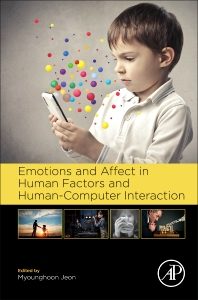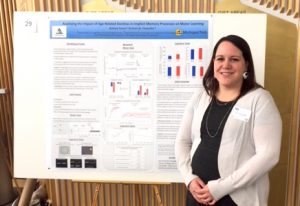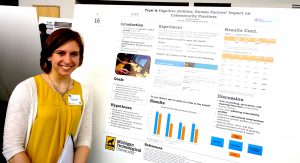 Adam Feltz has co-authored an article “The Means/Side-Effect Distinction in Moral Cognition” which was accepted for publication in the journal Cognition.
Adam Feltz has co-authored an article “The Means/Side-Effect Distinction in Moral Cognition” which was accepted for publication in the journal Cognition.
 Dr. Myounghoon “Philart” Jeon, Associate Professor in the Department of Cognitive and Learning Sciences and the Department of Computer Science, published his first handbook titled “Emotions and Affect in Human Factors and Human-Computer Interaction” with Elsevier publishing company on April 5th, 2017.
Dr. Myounghoon “Philart” Jeon, Associate Professor in the Department of Cognitive and Learning Sciences and the Department of Computer Science, published his first handbook titled “Emotions and Affect in Human Factors and Human-Computer Interaction” with Elsevier publishing company on April 5th, 2017.
“Emotions and Affect in Human Factors and Human-Computer Interaction“ is a complete guide for conducting affect-related research and design projects in H/F and HCI domains. Introducing necessary concepts, methods, approaches, and applications, the book highlights how critical emotions and affect are to everyday life and interaction with cognitive artifacts. The text covers the basis of neural mechanisms of affective phenomena, as well as representative approaches to affective computing, Kansei engineering, hedonomics, pleasurable product design, and emotional design.
Dr. Jeon is the founding director of the Mind Music Machine Lab. He also serves as a Director of the Center for Human-Centered Computing at the Institute of Computing and Cybersystems at Michigan Tech. His research focuses on HCI (Human-Computer Interaction) and HRI (Human-Robot Interaction), including Auditory Displays, Affective Computing, Assistive Technologies, Automotive User Interfaces, and Aesthetic Computing. His research has yielded more than 150 publications across top peer reviewed journals and conference proceedings. His research is currently supported by NIH (National Institutes of Health), DOT (Department of Transportation), FRA (Federal Railroad Association), Hyundai Motors Company, Equos Research Co., LTD., and MTTI (Michigan Tech Transportation Institute). Dr. Jeon teaches Affective Design and Computing, Human Factors, Human Fact ors II: Multimodal Design and Measures, Human-Robot Interaction, and Human-Centered Design, among others. He serves as an Associate Editor of MIT Press Journal, Presence: Teleoperators and Virtual Environments and Affective Design Technical Committee of International Ergonomics Association (IEA). He has recently guest-edited journal special issues in “subliminal perception” (Presence) and “social cars and connected vehicles” (Pervasive and Mobile Computing), “arts and aesthetics in VR (Presence), and “sonic information design” (Ergonomics in Design). He actively works in international conferences – chairing programs and sessions, organizing workshops, and serving as program committee in AutomotiveUI, ICAD, HFES, CHI, MobileHCI, UbiComp, and PersuasiveTech.
ors II: Multimodal Design and Measures, Human-Robot Interaction, and Human-Centered Design, among others. He serves as an Associate Editor of MIT Press Journal, Presence: Teleoperators and Virtual Environments and Affective Design Technical Committee of International Ergonomics Association (IEA). He has recently guest-edited journal special issues in “subliminal perception” (Presence) and “social cars and connected vehicles” (Pervasive and Mobile Computing), “arts and aesthetics in VR (Presence), and “sonic information design” (Ergonomics in Design). He actively works in international conferences – chairing programs and sessions, organizing workshops, and serving as program committee in AutomotiveUI, ICAD, HFES, CHI, MobileHCI, UbiComp, and PersuasiveTech.
 Applied Cognitive Science & Human Factors student Madeline Peabody will defend on Friday, March 31 from 12:00 pm to 1:00 pm in Meese Center 109. Her advisor is Elizabeth Veinott.
Applied Cognitive Science & Human Factors student Madeline Peabody will defend on Friday, March 31 from 12:00 pm to 1:00 pm in Meese Center 109. Her advisor is Elizabeth Veinott.
Title: Improving Planning: Quantitative Evaluation of a Premortem in Field and Laboratory Settings
Abstract: Planning can be difficult and developing techniques for evaluating plans has been limited. This thesis compares different plan evaluation techniques in a series of experiments.
The main techniques discussed are the Premortem Method and Worst-Case Scenario Method. The Premortem plan evaluation method can help people reduce overconfidence and generate more reasons a plan might not succeed. Only one experiment has validated this technique; therefore, one goal of the present series of experiments is to qualitatively and quantitatively examine the effectiveness of the Premortem Method in several different planning situations.
This research evaluates the extension of the Premortem to shorter planning time periods, evaluates the effectiveness with team generated and executed plans, and compares the use of this technique among individuals and teams. In Experiment 1, 52 Army Cadets operating in teams completed six time-constrained field exercises that required planning, half using the Premortem and half using a standard Military plan evaluation process. Compared to a control condition, when teams used the Premortem they had fewer fouls and less fixation with no change in execution time. In Experiment 2, 72 individual participants from university organizations used the Premortem Method or Worst-Case Scenario Method to evaluate their group’s plan for an engineering task.
Results from Experiment 2 indicated that there was no statistically significant difference in the number of reasons and solutions generated between methods. To further examine the relative effectiveness of these two plan evaluation methods, and the influence of group dynamics, Experiment 3 compared the efficacy of the Premortem and Worst-Case Scenario Method among groups and individuals in face-to-face settings with a complex and unfamiliar plan. Eighty-two participants generated more reasons with the Premortem Method than the Worst Case Scenario Method, and groups generated more solutions than individuals did.
Overall, the participants in groups using the Premortem Method produced more reasons and solutions than participants using the Worst-Case Scenario Method and individual participants using the Premortem Method. These studies extend prior work by validating that the Premortem is effective in short planning horizons, demonstrating that it works for individuals and teams, and clarifying potential boundary conditions. This research advocates several directions for future research, and suggests possibility of future implementation as a virtual tool or application.
 Brittany Turner’s research, Assessing the Impact of Age-Related Declines in Implicit Memory Processes on Motor Learning, was presented at Michigan Tech’s 2017 Undergraduate Research Symposium this past week. With the assistance of Dr. Kevin Trewartha, Turner investigated whether scores on an implicit memory test are correlated with the slow process and whether age-related declines in implicit memory are related to deficits in motor learning.
Brittany Turner’s research, Assessing the Impact of Age-Related Declines in Implicit Memory Processes on Motor Learning, was presented at Michigan Tech’s 2017 Undergraduate Research Symposium this past week. With the assistance of Dr. Kevin Trewartha, Turner investigated whether scores on an implicit memory test are correlated with the slow process and whether age-related declines in implicit memory are related to deficits in motor learning.
The Undergraduate Research Symposium highlights the amazing cutting-edge research being conducted on Michigan Tech’s campus by some of our best and brightest undergraduate students.
The students showcasing their work today have spent a significant portion of the past year working alongside Michigan Tech faculty and graduate students to explore, discover and create new knowledge. They’ve spent long hours in the lab or out in the field designing experiments, gathering data, creating new models and testing hypotheses. They’ve applied their classroom knowledge in new and sometimes unexpected ways, and developed new skills that will propel them forward in their careers.
 Abigail Kuehne’s research, Trust & Cognitive Abilities: Human Factors’ Impact on Cybersecurity Practices, was presented at Michigan Tech’s 2017 Undergraduate Research Symposium this past week.
Abigail Kuehne’s research, Trust & Cognitive Abilities: Human Factors’ Impact on Cybersecurity Practices, was presented at Michigan Tech’s 2017 Undergraduate Research Symposium this past week.
With the assistance of Dr. Adam Feltz, Kuehne attempts to help understand the human factors that increase vulnerability to threats in their privacy and security through internet crime and identity theft. In particular, trust and cognitive abilities appear to be two major predictors of being susceptible to phishing attacks. By determining the connection that allows/prevents the end user to susceptibility of phishing, we can implement interventions to help people protect themselves.
The Undergraduate Research Symposium highlights the amazing cutting-edge research being conducted on Michigan Tech’s campus by some of our best and brightest undergraduate students.
The students showcasing their work today have spent a significant portion of the past year working alongside Michigan Tech faculty and graduate students to explore, discover and create new knowledge. They’ve spent long hours in the lab or out in the field designing experiments, gathering data, creating new models and testing hypotheses. They’ve applied their classroom knowledge in new and sometimes unexpected ways, and developed new skills that will propel them forward in their careers.
 An AP news article titled “Michigan Tech Students Teach Tech to the Inexperienced,” which features Michigan Tech’s BASIC (Building Adult Skills in Computing) program, Charles Wallace (CS), and Kelly Steelman (CLS), was published in the Charlotte Observer, Kansas City Star, Miami Herald, Washington Times, and many other news outlets across the country.
An AP news article titled “Michigan Tech Students Teach Tech to the Inexperienced,” which features Michigan Tech’s BASIC (Building Adult Skills in Computing) program, Charles Wallace (CS), and Kelly Steelman (CLS), was published in the Charlotte Observer, Kansas City Star, Miami Herald, Washington Times, and many other news outlets across the country.
Drs. Wallace and Steelman were also featured on our blog post, Breaking Digital Barriers, last month highlighting their research.
Joan Schumaker Chadde (CEE/GLRC) is the principal investigator on a project that has received a $47,556 grant from Wayne State University.
The project is titled “FACTs & Careers: A Scalable Place-Based Educational Program at a Public Aquarium to Increase STEM Career Choices.”
This is the first year of a potential 2-1/2 year project totaling $146,375.
 Interactions, a magazine published by the Association for Computing Machinery, featured an article about Myounghoon “Philart” Jeon’s (CLS, CS) Mind Music Machine Lab.
Interactions, a magazine published by the Association for Computing Machinery, featured an article about Myounghoon “Philart” Jeon’s (CLS, CS) Mind Music Machine Lab.
Interactions is a flagship magazine, which all of HCI, UX, Interaction researchers and designers from all over the world read and cite.
Read the article.
